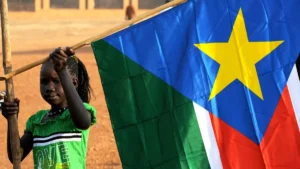- History beckons as push for Kenya’s Ruto to address US Congress gathers pace
- IMF’s Sub-Saharan Africa economic forecast shows 1.2 percent GDP growth
- The US Congress proposes extending Agoa to 2041, covering all African countries
- Millions at risk of famine as fuel tax row halts UN aid operations in South Sudan
- Empowering the Future: Humanity Protocol’s Dream Play Initiative
- TikTok Community Guidelines update aims to curb hate speech and misinformation
- Rwanda sees 39% surge in bank borrowers as Sacco and MFI loan uptake declines
- Kenya Ports Authority wins dispute case over cargo release
Browsing: premium
Registered traders and exporters are providing a sheen of legality by declaring a small percentage of their gold exports while pocketing massive profits from the illicit trade. …
On October 1st, the re-opening of the Zimbabwe border will enable cross-border trade between the majority of Zimbabwe’s SME’s, enabling access to goods from South Africa.
Faced with the drastic impact of Covid–19, Zimbabwe is finally re-emerging from a state of complete lockdown.
Only recently, Zimbabwean authorities have started reopening the economy in stages, as the country grapples to create economic momentum. A day after the Zimbabwe recorded a rise in COVID-19 recoveries on the 15th of September 2020, the Information Minister Monica Mutsvangwa announced a raft of relaxation protocols. Business operating hours where extended to 18:30 pm up from 16:30 pm, the national imposed curfew was reduced from 6pm -6am to 8pm – 6am.
The government went further and approved the resumption of inter-city travel in a move to open up the economy following nearly six months of restrictions due to …
Zimbabwe has over the years made headlines for many reasons politically and economically. The country has undergone severe hyperinflation, dollarization, de-dollarization, and recently pseudo re-dollarization. The capital markets have not been spared by this financial rollercoaster as evidenced by the little financial capital raised on the Zimbabwe Stock Exchange. Plans are at advanced stages for a new bourse to be based in Victoria Falls.
Understanding Zimbabwe’s Currency Matters and its impact on stocks
At the height of Zimbabwe’s economic crises, ordinary citizens became poor trillionaires and many corporates shut down or halted operations as they failed to cope with the situation. In 2009 the introduction of the multicurrency regime ushered in a period of stability that saw relative economic progression.
Companies and individuals could plan and work towards specific targeted goals that had been impossible in the hyperinflationary period. The multicurrency regime was abandoned …
The continuous spread of the COVID-19 pandemic across the world means that people’s ability to access safe and nutritious diets is at risk, further leading to an even wider global health crisis of the century.
Coronavirus has disrupted production, transportation, storage and sale of food and food items. Consequently, hunger and malnutrition levels have increased considerably especially because of the virus, even though many were already struggling with these issues prior to the pandemic.
According to a 2019 report, The State of Food Security and Nutrition in the World, over the past three years, the number of those suffering world hunger has been growing, only reflecting levels that were recorded almost a decade ago.
Also Read: Desert locusts , if not contained pose a threat to EAC’s food security; FAO
The report concludes that: “Hunger is on the rise in almost all African sub–regions, making …
The African art market has been on an exponential upward growth trajectory prior to the Covid-19 pandemic, but most recently is teetering on the brink of a precipice, thrusting many artists in a conundrum; the status quo, only to be likened to painting a hollow canvas. According to the Clare McAndrew’s report, ‘The Art Market 2020’,90% of art dealers had projected an increase in sales, heading into 2020, but the global pandemic has been diminishing this optimism and momentum. The latest Art Basel and UBS Global Art Market Report, indicates that global art sales achieved a total of $64.1 billion in 2019, 5% decrease from the 67.4 billion of 2018.
The African art scene has long remained unseen, but the last five years have been profoundly fundamental in the growth of this budding industry. It has brought about a renaissance; crossing over a …
Environmental, Social and Governance – three words that we now hear all the time when analysing and discussing investment. And three words that need to be an integral part of the due diligence for every investment decision. If you want to attract substantial investment into your business then you now need to make sure that your “ESG” story, policy and monitoring is solid and coherent.
There was a time when “ethical” investment was its own niche. Those who aspired to be ethical, or had deluded themselves into believing that their ethics were central to their business practice, charged into ethical investing. “Ethical investment” was plastered all over investment products and people who thought ethical investment reflected their beliefs, morals and personalities bought into products that were not really intelligent, profitable or ethical! That seems a very long time ago.
The next stages in the development of investment with …
The role played by education in addressing some of the challenges faced on the African continent cannot be underplayed. Not only does a good education have the capacity to improve individual livelihoods but also economic progression at a macro level.
The majority of the continent grapples with similar challenges including, poverty, exclusion, wars, HIV/AIDS, poor infrastructure among others. It stands to reason that there is a critical need for investing in Africa’s education to begin to make strides in addressing some of these issues.
While education can be considered a social service and therefore a government-related key result area, there is scope for non-government entities in the education sector.
Also Read: Future of Work: Africa should rethink its education, skills
The Business of Education in Africa.
According to UNESCO, Sub-Saharan Africa has the highest rate of education exclusion in the world. More than 20% of children …
The World Bank, in 2020, announced that the Nigerian economic may see a dip into recession, the worst the African country has seen in 40 years. This was largely due to the effects of the fall in the global price of oil, a commodity the nation‘s economy is heavily reliant on, and the outbreak of the COVID-19 pandemic, that nearly crippled not just Nigeria’s, but the global economy.
But these challenges were not the only catalysts for Nigeria’s imminent recession, issues around insecurity, infrastructural deficit, trade barriers, and power supply challenges all form a crude mix that has managed to drive the country down this very path.
Since the election of the Buhari’s administration in 2015, a lot more focus has been placed on driving local content and boosting local production, particularly in the agriculture sector. This was also in line to make the Nigerian economy …
In a 2019 Human Development Index1 (HDI) issued by the UNDP, countries with low human development include Liberia, Guinea Bissau, Sudan, Niger, Nigeria, Mauritania, Lesotho, Senegal, Togo etc. The Human Development Index is measured through three dimensions: long and healthy life, access to knowledge and decent standard of living. The major importance of the HDI is to enable countries to calculate the overall level of development and what sectors in the economy need more funding and attention. What this means is that countries with low HDI tend to suffer with high rate of unemployment, low Foreign Direct Investments (FDI), high mortality rate, poor infrastructures and so on. The key importance of the HDI is to drive economic diversification and economic growth. Beyond economic growth, it is also important to adopt development strategies that would solve the issue of social needs and increase inflow of investments.
A major reason …
There is a device being used rather often lately by our most vocal lobbyists as they chase new regulation or overturn old rules: ‘Europe’ has banned ‘it’, or done ‘it’, or changed ‘it’, they are telling us, as a reason to reshape our own policies.
However, the problem with this form of case-building, just as when our children tell us their friend’s parents allow ‘it’ or have bought ‘it’, is that the comparison comes without circumstantial detail, and with the possibility of being untrue in the way it is presented, or, at the very least, of being irrelevant to our own circumstances.
Indeed, few things are more illustrative of those pitfalls than the oft-cited banning of pesticides by Europe. In the ‘one-story-fits-all’ line of case-building, we are told that Europe has banned a mass of pesticides because they result in cancer and reproductive problems in humans. This is painful for …





